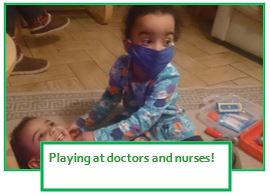How do we explain coronavirus to young children?
27th April 2020
Share this entry:
It is difficult to know if and how we should respond to young children at this time. Should we try to shelter them from the situation by avoiding talking about it or should we talk about it in a manner in which our young children will understand? Tamsin Grimmer shares her ideas about how parents/carers of young children should be responding to this situation.
Children will have noticed that something is different, regardless of whether we have discussed the pandemic with them! They’re not going to school, nursery or any of their usual groups, they haven’t seen Nanna for several weeks, Mummy and Daddy are always at home and don’t even take them to the 
We cannot avoid talking with young children about how our lives have changed because of the coronavirus and we shouldn’t feel we need to. Children are more resilient and have a greater depth of understanding than we often give them credit for. Sadly children also worry more than we might think, so I want to encourage parents and carers to not be afraid to talk with their children about this situation.
We can be supportive and honest and explain things to our children using language that they will understand. For example saying, “The coronavirus is a bug that people can get which makes them feel very poorly. They might feel very hot or have a nasty cough. Some people’s bodies will find it difficult to recover from the illness. Other people will get totally better. We need to stay at home to help stop the virus from spreading and to help the doctors and nurses to care for the people who are poorly.”
We might need to be prepared to talk with our children about death and what this means. Death is a very abstract concept
Top Tips
- Answer any questions about the coronavirus as honestly as possible, remembering that it’s OK to say, “I don’t know!”
- Use correct language with the children, e.g. virus, and encourage them to have their own narrative about it.
- Use this virus as an opportunity to reinforce the importance of hygiene, e.g. hand washing, and make this into a fun game – there are now some online videos to help with this, new songs to sing etc.
- Read stories and books which include illness and hygiene practices… (e.g. I don’t want to wash my hands by Tony Ross, Germs are Not for Sharing (board book) by Elizabeth Verdick and Why Must I Wash My Hands? by Jackie Gaff).
- Don’t talk about the coronavirus to other adults over the children’s heads – they will pick up on anxiety or worries.
- Explain that some people who have other illnesses or people who are very old might get very poorly, but most people who get the virus get totally better.
- Use playful interactions as a means of sharing about the virus— play at doctors and nurses, make up stories and rhymes, create sock puppets together.
- Celebrate and share stories about acts of kindness, or of everyday people being superheroes like Captain Tom Moore.
- Encourage your children to take part in initiatives like #chasetherainbow by drawing a rainbow together and putting it in your window. This is not only fun but helps us all to still feel part of a community.
- Use technology to support their social lives as well as your own. If possible, video call friends or ask family members to read them a bedtime story over the phone.
- Lastly, have fun together. This is an amazing opportunity for you to spend more time with your child and to enjoy their company.
About the author
Tamsin Grimmer is an experienced Early Years Consultant with a Master’s Degree in Early Childhood Education. Tamsin believes that all children deserve practitioners who are inspiring, dynamic, reflective and passionate about their learning. When children have the very best start in their early years, they adopt positive dispositions and attitudes to learning. The main way that Tamsin assists with this is through inspiring and motivating those who teach them through delivering training and consultancy. In addition, Tamsin has written several books aimed at educators. Tamsin’s previous roles have included Early Years Consultant for two local authorities, Area SENco, teacher, Mentor for EYP and EYT, PGCE lecturer and outstanding childminder.
Contact Tamsin:
Email: Tamsin.grimmer@lindenlearning.org Twitter: @tamsingrimmer
Why attend Childcare & Education Expo?
Join over 2,500 like-minded individuals from the early years & primary sector who are dedicated to improving their practice and their education settings.
Attend educational seminars to credit your CPD
Meet the experts to have your questions answered
Receive fantastic onsite offers and discounts
Experience expert-led informative hands-on workshops
Network with peers and industry players
Pick up hundreds of new products, resources, ideas and services
And most of all, enjoy a great day out with your colleagues




